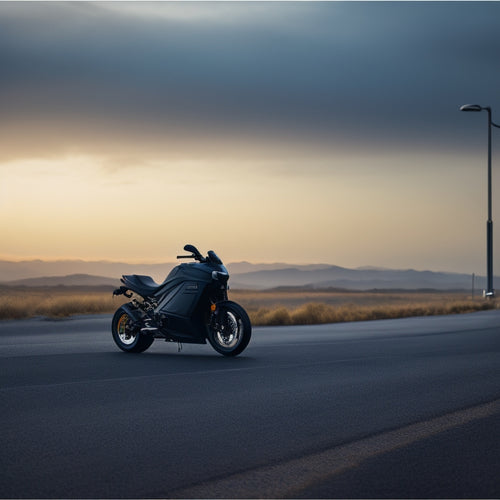
What to Look for in Portable Car Solar Kits
Share
When shopping for a portable car solar kit, you'll want to evaluate key components like the solar panel, charge controller, and battery. Take into account the kit's power output, efficiency, and durability features like waterproof coatings and UV protection. Think about portability and storage options, as well as charging speed and capacity. Confirm the kit is compatible with your vehicle's systems and meets safety standards. Finally, weigh the price against the value and long-term benefits. By examining these factors, you can find a kit that meets your energy needs - and uncover more nuances to ponder as you explore further.
Key Takeaways
• Consider the brand's reputation for technical support and user-friendly interface when selecting a portable car solar kit.
• Evaluate the power output and efficiency based on factors like peak sun hours, solar irradiance, and climate variability.
• Check the durability and weather resistance features, such as waterproof coatings, UV protection, and IP67 rating, to ensure the kit can withstand outdoor conditions.
• Ensure the kit is compatible with your vehicle's electrical system, considering voltage compatibility, current capacity, and electrical interference protection.
• Calculate the cost per watt and consider the included components, warranty, and support quality to determine the kit's overall value and long-term benefits.
Key Components to Consider
When selecting a portable car solar kit, you'll want to focus on four key components: the solar panel, charge controller, battery, and inverter, as these will determine the kit's overall performance and reliability.
First, consider the brand reputation - you want a manufacturer that stands behind their product with solid technical support.
Look for a user interface that's easy to navigate, so you can monitor and adjust your setup with ease.
Installation type is also important - do you prefer a plug-and-play system or a more customizable setup?
Think about cable management, too - a tidy setup is safer and less prone to damage.
Power Output and Efficiency
When evaluating portable car solar kits, you'll want to take into account the power output and efficiency to make sure you're getting the most out of your system. This means looking at the peak sun hours your kit can harness, the energy conversion rate that determines how efficiently it generates power, and the wattage capacity that dictates how much power it can produce.
Peak Sun Hours
You can expect a portable car solar kit's power output and efficiency to be heavily influenced by peak sun hours, which are the hours of the day when the sun's rays strike the Earth at an angle of 90 degrees, resulting in maximum energy output. Peak sun hours vary depending on your location, time of year, and climate.
Here are some key factors to take into account when evaluating peak sun hours:
-
Solar Irradiance: The amount of energy received from the sun per unit area. Higher irradiance means more energy output.
-
Climate Variability: Regions with frequent cloud cover or extreme temperatures will have lower peak sun hours.
-
Latitude and Altitude: Areas closer to the equator and at higher elevations typically receive more direct sunlight.
- Time of Year: Peak sun hours are usually highest during the summer months when the sun is highest in the sky.
Understanding peak sun hours is important when selecting a portable car solar kit, as it directly impacts the kit's ability to generate power. By taking these factors into consideration, you can choose a kit that meets your energy needs and performs efficiently in your specific environment.
Energy Conversion Rate
The energy conversion rate of a portable car solar kit, assessed based on power output and efficiency, plays a critical role in determining its overall performance. You want to guarantee the kit can convert sunlight into usable energy efficiently, minimizing energy loss.
A higher power output means you'll have more energy to charge your devices, and who doesn't love that? When evaluating a kit's energy conversion rate, look for its power hierarchy. A higher ranking means the kit is more efficient at converting sunlight into energy.
A kit with a high power output but low efficiency mightn't be the best choice, as it may waste energy due to heat or other losses. You want a kit that can efficiently convert sunlight into usable energy, not one that's just flashy with high power output but poor efficiency.
Wattage Capacity
Your portable car solar kit's wattage capacity, measured in watts (W), determines how quickly it can charge your devices, with higher-capacity kits allowing you to power multiple devices simultaneously. When evaluating a kit, take into account your power needs and the devices you want to charge. A higher wattage capacity doesn't always mean better, as it may come with a higher price tag and larger size.
Here are key factors to keep in mind when assessing a kit's wattage capacity:
-
Solar Intensity: A kit's wattage capacity is affected by the intensity of sunlight it receives. Look for kits with high-efficiency panels that can harness energy even in low-light conditions.
-
Power Reserve: A kit's power reserve determines how long it can continue to power your devices during periods of low solar intensity or at night.
-
Consider the type of devices you want to charge and their power requirements. For example, smartphones typically require 5-10W, while laptops may need 30-60W.
- Kit size and portability: Balance wattage capacity with the kit's size and portability. A higher-capacity kit may be bulkier and heavier, making it less portable.
Durability and Weather Resistance
When selecting a portable car solar kit, it's important to make sure it can withstand the elements. A durable kit will have a waterproof coating to protect its electrical components from rain and moisture.
You should also look for a robust frame design that can resist bending and warping under windy or heavy snow loads.
Waterproof Coatings Matter
You can't afford to overlook the importance of waterproof coatings when shopping for a portable car solar kit, since they directly impact the system's durability and weather resistance. A high-quality waterproof coating is essential to protect your investment from the harsh outdoor environment.
When evaluating portable car solar kits, look for the following key features:
-
Marine-grade coatings: These provide exceptional UV protection and can withstand the rigors of marine environments.
-
IP67 or higher rating: This guarantees the system can withstand immersion in water beyond 1 meter for at least 30 minutes.
-
UV-resistant materials: These prevent degradation of the solar panels and other components from prolonged sun exposure.
- Durable encapsulation: This ensures the electrical connections and components are fully sealed and protected from moisture and dust.
Robust Frame Design
A sturdy frame design is crucial in portable car solar kits, providing the structural backbone that guarantees durability and weather resistance in harsh outdoor environments. When you're on the go, you can't afford to have your solar kit compromised by flimsy construction. That's why you should look for a kit with an aerodynamic shape, which reduces wind resistance and keeps the entire setup stable.
A robust frame design also means corrosion protection, so you don't have to worry about rust or oxidation weakening the structure over time. You want a frame that can withstand the elements, from scorching desert sun to torrential rain. A high-quality frame should be able to take a beating and keep on ticking. Don't settle for anything less!
When evaluating portable car solar kits, inspect the frame's material, thickness, and overall build quality. A sturdy frame guarantees your solar kit will keep generating power, no matter what Mother Nature throws its way.
Portability and Storage Options
When evaluating portable car solar kits, consider the weight and size of the system, as compactness and lightness directly impact transportation convenience. You want a kit that's easy to carry around, not one that's going to weigh you down.
A portable solar kit should be designed with travel in mind, making it effortless to take with you on the go.
Here are some key features to look for in a portable car solar kit:
-
Travel cases: Look for kits that come with durable, protective cases that can withstand the rigors of travel.
-
Foldable designs: A foldable design allows for easy storage and transportation, making it a great feature to have in a portable solar kit.
-
Compact panels: Smaller, lighter panels are easier to handle and store, making them perfect for portable kits.
- Carrying handles: A sturdy carrying handle can make a big difference when transporting your kit, so be sure to check for this feature.
Charging Speed and Capacity
When shopping for a portable car solar kit, it's important to consider the maximum power output, measured in watts (W). A higher power output means faster charging times, but it also depends on the solar intensity - so don't expect lightning-fast charging on cloudy days!
The capacity of the battery, measured in ampere-hours (Ah), is another crucial factor to consider. The battery's capacity determines how much energy you can store for later use. Look for a kit with a high-capacity battery that's designed to maintain good battery health, even after multiple charge cycles.
A good rule of thumb is to choose a kit with a battery capacity that's at least 20% higher than your device's capacity. By taking these factors into account, you'll be well on your way to finding a portable car solar kit that meets your on-the-go power needs.
Compatibility With Vehicle Systems
You'll need to verify that the portable car solar kit is compatible with your vehicle's electrical system, specifically the voltage and current requirements, to avoid any potential damage or safety risks. Think of it like trying to force a square peg into a round hole - it just won't work, and might even cause some damage along the way.
To guarantee seamless vehicle integration, check for the following:
-
Voltage compatibility: Make sure the solar kit's output voltage matches your vehicle's electrical system voltage (usually 12V or 24V).
-
Current capacity: Confirm that the solar kit's current output (in amps) doesn't exceed your vehicle's electrical system's capacity.
-
Electrical interference protection: Look for kits with built-in protection against electrical interference, which can cause issues with your vehicle's electronics.
- Vehicle-specific adapters: If your vehicle has specific electrical requirements, ensure the solar kit comes with compatible adapters to prevent any electrical mismatches.
Safety Features and Certifications
As you evaluate portable car solar kits, scrutinize their safety features and certifications to verify they meet rigorous standards, safeguarding you and your vehicle from potential risks. It's important to confirm that the kit you choose won't turn your car into a fire hazard or electrical nightmare.
Look for UL compliance, which guarantees the product meets specific safety standards in the US. The CE markings, on the other hand, signify compliance with European health, safety, and environmental protection standards. These certifications indicate that the manufacturer has taken necessary measures to prevent electrical shocks, overheating, and other hazards.
When checking the certifications, don't just glance at the logos; verify the kit's compliance on the manufacturer's website or through third-party testing organizations. Be cautious of kits with vague or missing certifications – they might put your vehicle and safety at risk.
Price and Value for Money
When evaluating portable car solar kits, the price tag is often a significant deciding factor, and it's important to assess whether the cost aligns with the value you'll receive regarding performance, durability, and convenience. You don't want to break the bank, but you also don't want to sacrifice quality for the sake of saving a buck.
Considering your budget constraints, ask yourself:
-
What's the cost per watt? Calculate the cost per watt to determine the kit's cost-effectiveness.
-
What's included in the kit? Make sure you're getting a complete system, including a solar panel, charge controller, and cables.
-
What's the warranty and support like? A good warranty and reliable customer support can save you headaches (and money) in the long run.
- What are the operating costs? Consider the cost of maintenance, repairs, and replacement parts to make sure you're getting the best bang for your buck.
Frequently Asked Questions
Can I Use a Portable Car Solar Kit for Camping or Outdoor Activities?
"You're ready for off-grid adventures and remote escapes! Yes, you can use a portable car solar kit for camping or outdoor activities, providing reliable power for your gadgets on the go."
Will a Solar Kit Drain My Car Battery When Not in Use?
When you're not using your portable solar kit, it won't drain your car battery if you've got a Deep Cycle battery, Battery Isolation, and Smart Controllers ensuring energy efficiency - so, relax, your car's battery is safe!
Can I Install a Portable Solar Kit Myself or Do I Need a Professional?
'Hey, DIY enthusiast! If you've got basic wiring know-how and can follow instructions, you can install a portable solar kit yourself. Otherwise, consider hiring a pro with professional certification to guarantee a safe and efficient setup.'
Are Portable Car Solar Kits Suitable for All Vehicle Types and Sizes?
You're wondering if portable car solar kits are suitable for all vehicle types and sizes. The answer is, it depends! Check your vehicle's roof size, weight capacity, and aerodynamics to guarantee a compatible fit, as some kits may not adapt to large trucks or small motorcycles.
Can I Expand or Upgrade My Portable Solar Kit in the Future?
You're thinking ahead! With a modular design, you can easily upgrade or expand your portable solar kit in the future, futureproofing your investment and keeping you powered up on the go!
Related Posts
-

Why Electric Motorcycles Fail at Long-Distance Touring
You're likely familiar with the excitement of hitting the open road on an electric motorcycle, but you're also smart ...
-

What Makes a Road Bike-Friendly by Design?
As you plan and design roads, incorporating features like dedicated bike lanes, smooth surfaces, and traffic calming ...
-

Best Solar Panel Options for Maximum Energy Savings
You can maximize your energy savings with solar panels that boast efficiency ratings above 20%, paired with extensive...


